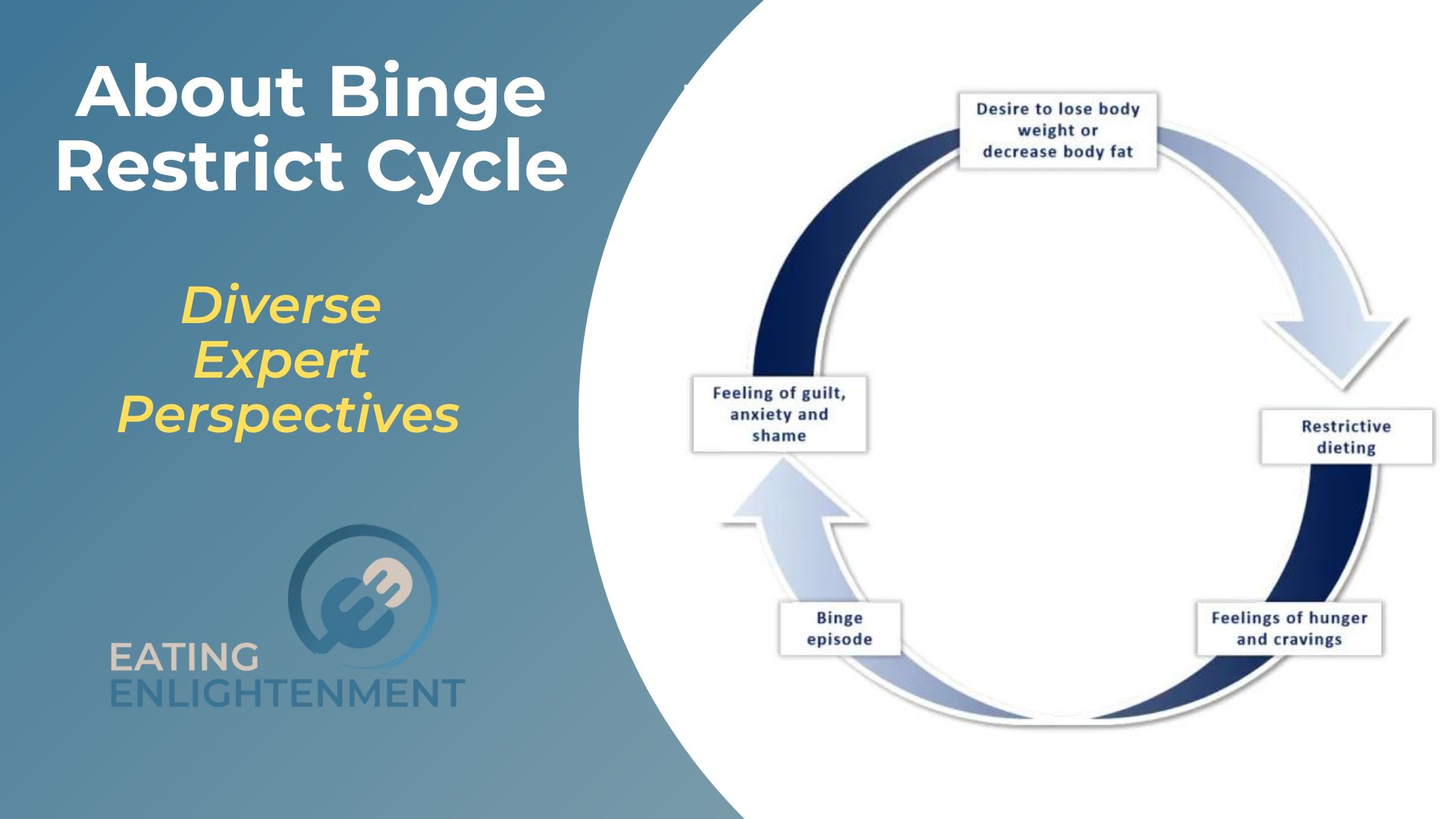When it comes to our relationship with food, there are a lot of patterns that can develop. One pattern that seems to be pretty common is the binge-restrict cycle.
This is where we go from eating normally or overeating occasionally, to restricting our food intake severely, and then bingeing on everything in sight.
This pattern can be incredibly destructive both physically and emotionally, as I’ve come to see personally and professionally.
Ever since the beginning of Covid, I’ve had the unique opportunity to work at a residential eating disorder treatment center.
I’ve seen hundreds of patients come through the doors, spend 1-2 months at our center, and over these years I’ve really got to know some clients on a personal level.
I’ve heard them describe all sorts of eating struggles, and use different descriptions and linguistic terms to describe their habits and feelings.
I myself know all too well how difficult it is to put words to these incredibly complex and confusing dynamics between food, body, mind and soul.
But yet we must bring understanding and light to this disorder, disease that is known as disordered eating.
I’ve found over the past 5 years working as a personal coach for people with overeating struggles and through my own personal health journey, that understanding habits is the key to freedom.
But what if you have multiple habits that intertwine with each other and make things horribly confusing?
If you want to stop binge and emotional eating, and have a normal easy relationship with food then you must understand this “core” pattern, which I all the Binge-Restrict Cycle.
But how?
In this article, we will take a look at some descriptions of the Binge-Restrict Cycle from different experts and authorities in the field.
You’ll see a diversity of perspectives so that you’ll get a better understanding of the deeper patterns.
Please know this is only a mere intellectual understanding and won’t actually help that much to stop binge eating. Brutal truth!
However, an intellectual framework is still important because you can begin to direct your efforts appropriately.
By understanding what I call the Binge-Restrict Cycle, you can start to journal about this pattern and free yourself.
Journaling is how you bring this intellectual knowledge of The Binge Restrict Cycle to life in a practical way.
Because when you journal throughout the day (or weeks) as you cross through the different stages of the Binge Restrict Cycle, your journaling practice automatically teaches you the lessons of nutrition, mindfulness and compassion you ultimately need to be free.
My sincere desire in writing this post is so that you can deepen your understanding of this pattern, and by understanding this pattern better, you can start to break it and have a healthier relationship with food!
Be sure to leave a comment below with your thoughts!
What is the Binge Restriction Cycle?
The binge restriction cycle is a dangerous pattern of behavior that can lead to an eating disorder. The cycle begins with a period of restrictive dieting, which leads to feelings of deprivation and hunger. In addition to nutritional and physical deprivation, an individual can also be emotionally deprived. These deprivation feelings eventually become overwhelming, leading to a binge on high-calorie foods.
The individual then feels guilty and ashamed, leading to another cycle of restrictive dieting. This pattern can be difficult to break, but it is essential for maintaining a healthy relationship with food. Treatment for an eating disorder often includes counseling and support groups, which can help people break the cycle of restriction and bingeing.
With some help, people can learn to eat in a healthier way and have better mental health outcomes.
With this basic definition in mind, let’s now look at what various authors say about this cycle!
Notice: even though these experts come from diverse backgrounds, they pretty much all describe the same thing!
Under each book, which I’ve read and value, you’ll see snippets from the book in which the authors talk about the Binge-Restrict Cycle.
My hope is you can see how all these different people talk about this problem in basically the same way.
By seeing repeated examples of this pattern, you can internalize this intellectual knowledge and more deeply understand your behaviors.
The Rules of “Normal” Eating
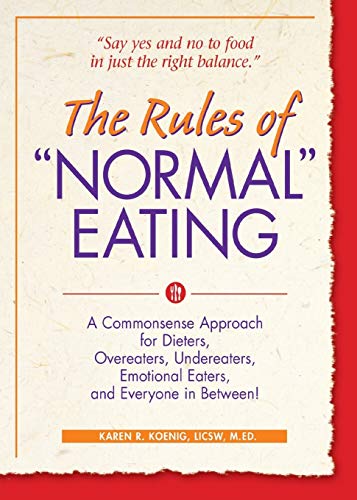
An unhealthy relationship with food, weight, and body image can cause scores of irrational beliefs—beliefs that will affect every aspect of your life. The Rules of “Normal” Eating targets these beliefs, feelings, and behaviors, and points the way toward genuine physical and emotional fulfillment. Filled with humorous insights, compassion, and practical wisdom, this book outlines balanced attitudes and patterns that will benefit all types of eaters.
What Rules of Normal Eating Says about The Binge Restrict Cycle
- If you’re reading this book, you’ve probably been struggling with eating problems for many frustrating years. You may have a hard time saying no to food, and you may feel deprived when you restrict your self. Or you may have a hard time saying yes to food, and then feel guilty and ashamed when you feed your body what it really wants.
- You might be a chronic dieter some or most days (or weeks or months), only to turn into a binge eater on weekends. Disordered eaters come in all weights, shapes, and sizes and use their relationship with food in a variety of unhealthy ways.
- What they share is a set of destructive attitudes and behaviors about food, eating, and weight that keep them out of touch with their bodies, disconnected from their feelings, and unaware of their true inner needs.
If you’ve tried every diet that’s come down the pike or restricted your caloric intake for years or even decades, then it might seem far too scary to think about giving up external constraints, such as counting calories or carbs, weighing or measuring your food, stepping on the scale daily, and begin learning to trust your body with food. - You may feel so attached to being thin that you can’t imagine putting on a few pounds in exchange for becoming a healthy eater. You may be so terrified of food and fat that even the thought of eating high-calorie or high-fat foods makes you shudder. In this thin-obsessed culture, you may not realize that your inability to say yes to food is as much of a problem as someone else’s inability to say no.
- The goal is to say yes and no to food in just the right balance. To achieve this kind of healthy equilibrium requires a radically new way of thinking and behaving around food. Most of all, it means giving up dieting and the destructiveness of the diet mentality.
My Interview with Karen Koenig
For more episodes view the Eating Enlightenment Podcast on iTunes.
End Emotional Eating
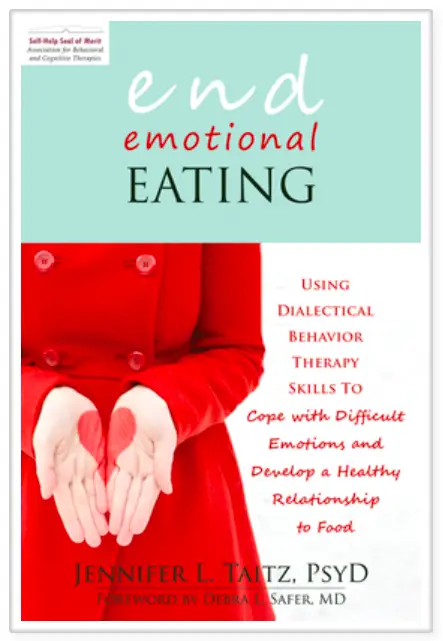
Eating can all too easily become a strategy for coping with depression, anxiety, boredom, stress, and anger, and a reliable reward when it’s time to celebrate.
This book does not focus on what or how to eat—rather, teaches scientifically supported skills will teach you how to manage emotions and urges gracefully, live in the present moment, learn from your feelings, and cope with distress skillfully.
This book has been awarded The Association for Behavioral and Cognitive Therapies Self-Help Seal of Merit — an award bestowed on outstanding self-help books that are consistent with cognitive behavioral therapy (CBT) principles and that incorporate scientifically tested strategies for overcoming mental health difficulties.
What End Emotional Eating Says About The Binge Restrict Cycle
- Generally, people who struggle with eating disorders over evaluate their shape and weight and are intensely preoccupied in attempts to manage their size. Binge eating is also very common across eating disorders.
- If you define yourself by your weight, you may restrict your food, and restricting food often results in overeating, as you start to feel deprived. After a diet people may tend to indulge in foods they craved during the diet.
- People often also binge in response to negative moods or to having a difficult day. People may either increase or decrease their eating as a result of distress. For example, some people experience an increase in appetite when they feel depressed, while others experience a decrease.
- Restricting food may be a way to manage emotions, as may bingeing. You may find yourself indulging when a feel difficult emotions in order to soothe yourself, and then putting yourself on harsh diets in an attempt to control your weight and you your feelings.
12 Steps and 12 Traditions of Overeater’s Anonymous
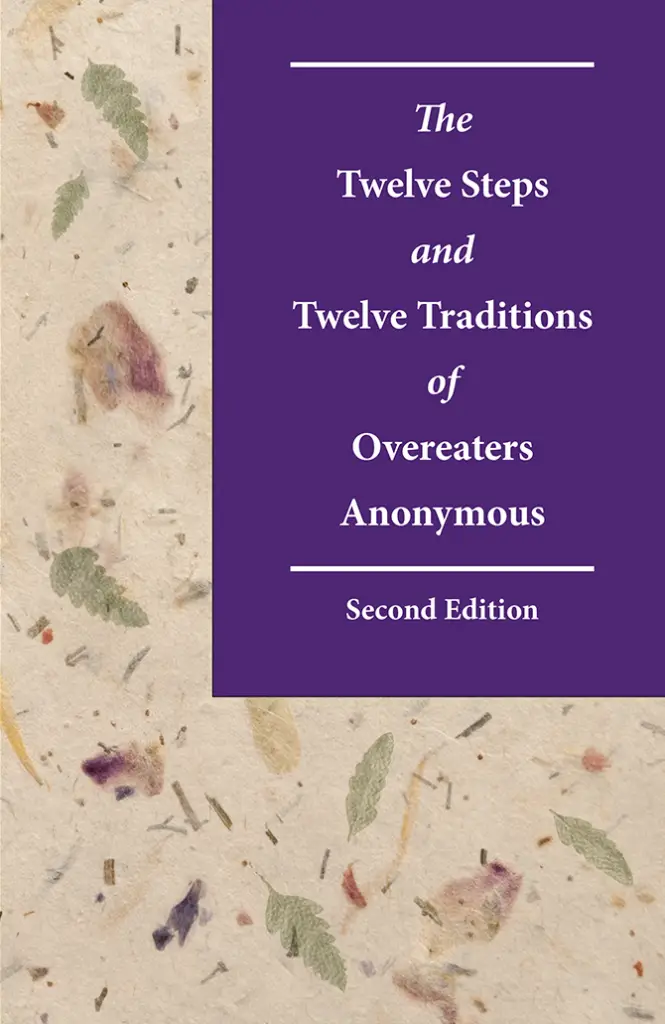
Overeaters Anonymous is a fellowship of individuals who, through shared experience, strength, and hope, are recovering from compulsive overeating. This book welcomes everyone who wants to stop eating compulsively. There are no dues or fees. The primary goal of this book is to help readers abstain from compulsive eating and to carry the message of recovery through the Twelve Steps of OA.
What Overeaters Anonymous Says About The Binge Restrict Cycle
- Before we found OA, every diet or period of control was followed by a period of uncontrolled eating. This is because our malady was not just physical in nature; it was emotional and spiritual as well. We were obsessed with food, and no amount of self-control or weight loss could cure us.
- Because of this obsession, the day always came when the excess food looked so inviting to us we couldn’t resist, and our firm resolutions were forgotten. Sooner or later, we lost control and returned to compulsive eating and compulsive food behaviors.
- This mental obsession was something we couldn’t be rid of by our unaided human will. If we were to stop eating compulsively, and stay stopped, we had to find another power, stronger than ourselves, for relief.
- Most of us have tried to deny to ourselves that we have this disease. In OA we are encouraged to take a good look at our compulsive eating, obesity, obsession with food, and body image and the self-destructive things we have done to avoid obesity-the dieting, starving, over-exercising, or purging.
- Once we honestly examine our histories, we can deny it no longer: Our eating and our attitudes toward food are not normal; we have this disease.
Intuitive Eating
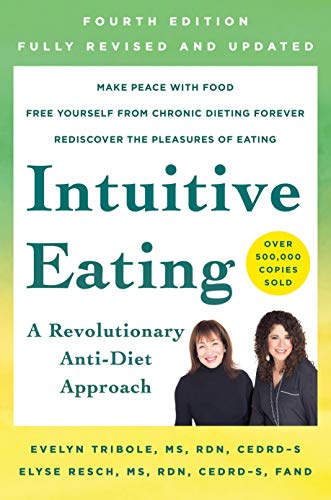
When it was first published, Intuitive Eating was revolutionary in its anti-dieting approach. The authors, both prominent health professionals in the field of nutrition and eating disorders, urge readers to embrace the goal of developing body positivity and reconnecting with one’s internal wisdom about eating―to unlearn everything they were taught about calorie-counting and other aspects of diet culture and to learn about the harm of weight stigma. Today, their message is more relevant and pressing than ever.
What Intuitive Eating Says About The Binge Restrict Cycle
- Dieting is a form of short-term starvation. Consequently, when you are given the first opportunity to really eat, eating is often experienced at such intensity that it feels uncontrollable, a desperate act. In the moment of biological hunger, all intentions to diet and the desire to be thin are fleeting and paradoxically irrelevant.
- In those moments, we become like the insatiable man-eating plant in the movie Little Shop of Horrors, demanding to eat -“Feed me, feed me.”
- While intense eating may feel out of control, and unnatural, it is a normal response to starv ing and dieting. Yet so often, post-diet eating is viewed as having “no willpower,” or a character defect.
- But when you interpret post-diet eating as such, it slowly erodes trust in yourself with food, diet after diet. Every diet violation, every eating situation that feels out of control lays the foundation for the “diet mentality,” brick by brick and diet by diet. The seemingly brave solution— try harder next time becomes as bewildering as the Chinese finger puzzle. You can’t fight biology. When the body is starving, it needs to be nourished.
- Yet so often a dieter laments, “If only I had the willpower.” Clearly, this is not an issue of willpower.
Brightline Eating
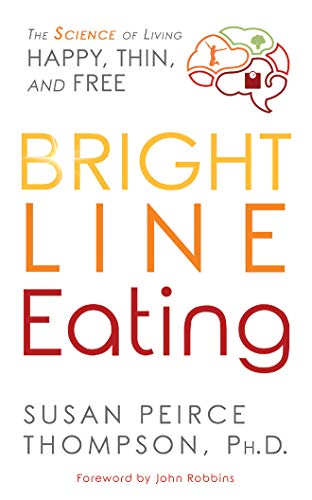
In this book, Susan Peirce Thompson, Ph.D. shares the groundbreaking weight-loss solution based on her highly acclaimed Bright Line Eating Boot Camps.
Rooted in cutting-edge neuroscience, psychology, and biology, Bright Line Eating explains why people who are desperate to lose weight fail again and again: it’s because the brain blocks weight loss.
Through the lens of Susan’s own moving story, and those of her Bright Lifers, you’ll discover firsthand why traditional diet and exercise plans have failed in the past. You’ll also learn about the role addictive susceptibility plays in your personal journey, where cravings come from, how to rewire your brain so they disappear, and more.
What Brightline Eating Says About The Binge Restrict Cycle
- They start each day with good intentions. They exercise, which depletes their willpower. They have an average day, meaning whether at home with kids, or at work, they are emotionally regulating them selves, which depletes their willpower. They check their e-mail. And they are resisting near constant temptations to eat. By the time dinner rolls around, many of them will turn to their spouse and say “Let’s order pizza” and not even know why.
- Most people lose willpower, not just minor gaps of willpower but canyons – the kind that completely derail our weight-loss efforts and send us back to square one. Over, and over, and over again.
- Diet programs that focus extensively on how to exercise and what – and what not – to eat, but fail to incorporate a program of behavioral intervention to bridge the Willpower Gap are doomed to be ineffective.
Heal Your Hunger
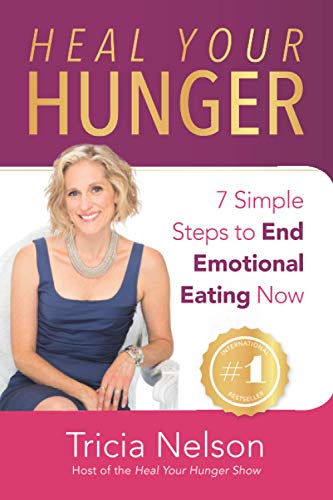
Ninety-eight percent of all diets fail because they don’t address the crux of the problem: emotional eating. In this revolutionary look at the close link between eating and emotions, Tricia Nelson guides you on a path of healing. These seven simple steps will transform your eating, cure your cravings, and help you regain happiness, confidence, and freedom.
If you are an emotional eater, binge eater, food addict, or sugar addict or suffer from any kind of disordered eating, this book will revolutionize your relationship with food. The obsession with food and weight is a symptom of something deeper. Learn how to identify and heal the root causes so you can stop battling your weight and start enjoying your meals, your body, and your life – without succumbing to crazy diets or exercise plans.
What Heal Your Hunger Says About The Binge Restrict Cycle
- The Dieting Triangle of Despair = Diet, Binge, Beat Self Up
- It starts out innocently enough. You want to lose a few pounds, so you decide to go on a diet. You read everything you can get your hands on about the diet plan. You feel powerful, in control. A wave of excitement washes over you. This time it’s going to be different—this time is going to be “it.” All you have to do is follow a few simple rules, and thinness is practically guaranteed!
- You giddily clear out your cupboards, feeling a surge of hope as you toss forbidden foods and shop for new, diet-approved meals. You have an initial brilliant splash of success, and have no trouble sticking to the strict rules of your new plan. No carbs? No problem! Oil-free tuna on cardboard crackers? So worth it. You quickly lose a few pounds. People start to notice. You feel exhilarated and determined-even superior
- But the deprivation starts to take its toll. How long can you last? A week? A few more days? Until the waiter takes the bread basket away? Suddenly, you find yourself freakishly aware of what everyone around you is eating. Your boss passes your desk carrying a fresh cranberry orange muffin drenched in thick white icing. Your best friend orders seasoned curly fries with her turkey club. You feel the pressure starting to mount. The fearful, hungry voice deep inside starts up quiet at first, but growing steadily louder… You can’t keep this up much longer. You just want normal food. When is it going to end? This is getting too hard!!
- Then, something happens. Your social-climbing coworker nabs the credit for a project you created. You’re on the phone for forty minutes, trying to get a real human being to explain the $600 credit card charge you didn’t make. Your toddler launches a sippy-cup cannon across your back seat, causing a (soon-to-be) sour milk explosion all over your carpet and upholstery. What ever it is, you’ve reached your limit-and food is the only thing that will scratch this life-or-death MUST-eat-now itch. Your resolve snaps. You eat.
- This lands you face down in the second point of the triangle: the binge. Inevitably, the daily stress and demands become too great. The relent less build-up of pressure from restricting gets too intense. You’ve tried so hard, but you just can’t keep it up any longer. You break your diet. And when you blow your diet, you don’t just modestly nibble a couple of M&Ms. No, you devour them by the handful in savage, urgent gulps. The adrenaline pumps through your veins like a drug. In a frenzy of euphoric excitement, you sneak to the mini-mart or drive-thru and load up on chips, ice cream, fries, cookies-anything and everything that’s been off-limits. The floodgates are open. You binge. Hiding in the privacy of your car or kitchen, you mentally check out and dive into the numbing sugary, salty abyss with anxious abandon. You polish off a whole bag of cookies, inhale an extra-large box of hot, grease-glistening fries, and finish it up with an entire pint of ice cream, punctuated by bites of crispy potato chips.
- Ah, if only it ended there. The second your spoon hits cardboard at the bottom of the carton of Rocky Road, the fog lifts. You come to-stunned. Startled by how much you’ve eaten. You’re even a little disoriented. And before you can get your bearings, the most ruthless of self-punishers, the Mean Girl, lashes out over the mic of your mental sound system. I can’t believe you did that! You completely blew it! You fat, disgusting pig!! You’re never going to be thin!! She is relentless. She belittles and berates you. Nothing is off-limits as she scathes you with her caustic commentary. The anxiety and disappointment of “blowing it” fuels the ferocity of her attack. You’ve eaten so much. You feel so powerless. So out of control.
My Interview with Tricia Nelson
Anti Diet
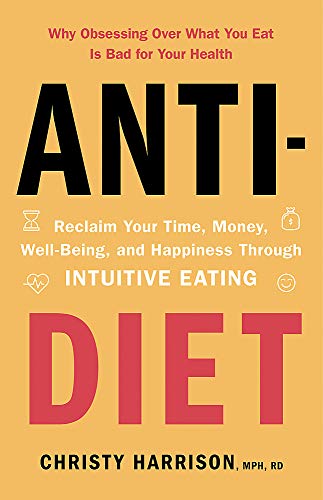
Sixty-eight percent of Americans have dieted at some point in their lives. But upwards of 90 percent of people who intentionally lose weight gain it back within five years. And as many as 66 percent of people who embark on weight-loss efforts end up gaining more weight than they lost. If dieting is so clearly ineffective, why are we so obsessed with it?
The culprit is diet culture, a system of beliefs that equates thinness to health and moral virtue, promotes weight loss as a means of attaining higher status, and demonizes certain ways of eating while elevating others. It’s sexist, racist, and classist, yet this way of thinking about food and bodies is so embedded in the fabric of our society that it can be hard to recognize. It masquerades as health, wellness, and fitness, and for some, it is all-consuming.
In Anti-Diet, Christy Harrison takes on diet culture and the multi-billion-dollar industries that profit from it, exposing all the ways it robs people of their time, money, health, and happiness.
What Anti Diet Says About The Binge Restrict Cycle
- Here’s what that looks like in our lives: first we restrict, restrict, restrict (or “eat clean, eat clean, eat clean”)… then we end up eating to the point of discomfort, often on foods that were deemed for bidden.
- And that makes us think we have no self discipline, we’re out of control, we simply can’t be trusted to eat certain foods, we’re uniquely broken while everyone else can have a bowl of ice cream without polishing off the whole carton. We berate ourselves as though what happened was about our minds, our lack of willpower.
- But it’s not. It’s physiological—a survival impulse encoded into your body. When you get cold, you shiver. That’s how your body keeps you warm so that you can survive. And when you’re restricted or deprived of food, your body turns up the food-seeking signals because it wants you to survive. It pumps out the hunger hormones, turns down the fullness hormones, and lowers your metabolic rate, all in the service of keeping you from starving. This isn’t a failure of your mind to control your body; this is your body taking care of you.
- If you’re bingeing in response to a diet, here’s what I want you to know: Your body is not bro ken. You are not broken. You haven’t irreparably damaged your hunger-and-fullness sensors. Your body is just trying to protect you. This is a natural, predictable, automatic response to famine— and that’s what diets are. It’s not you. It’s not a defect. The Restriction Pendulum has allowed our species to survive, so we wouldn’t be here with out it.
How long does a binge restrict cycle last?
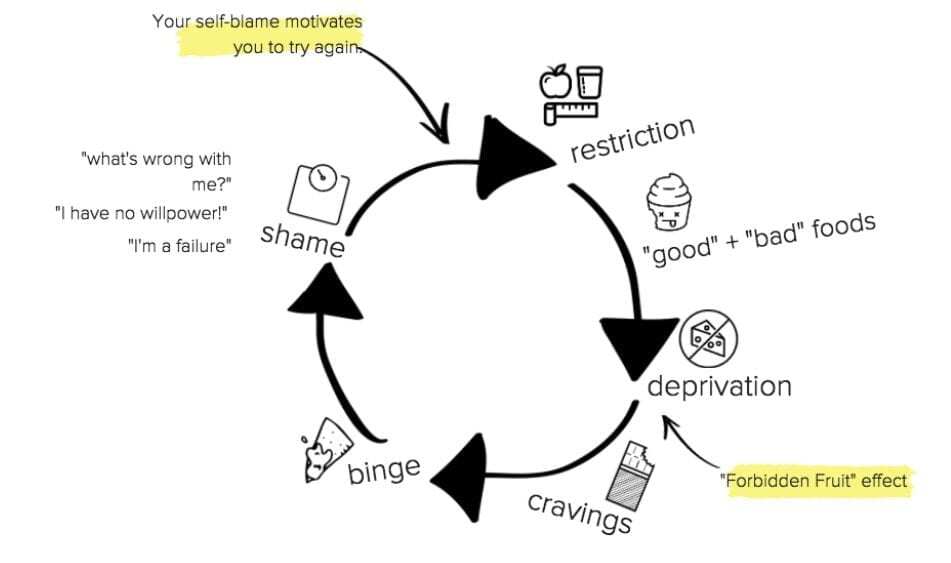
There is no one answer to this question, as the length of a binge restrict cycle can vary depending on a number of factors. For a few people who start bingeing because of a difficult life transition, the cycle may last for a few days or weeks. However, the majority of overeaters struggle with bingeing for months, years and decades.
The key thing to remember is that the cycle can be broken at any time, and that there is always help available if you feel like you are struggling to break free from binge eating. If you are concerned about your binge eating, or if you feel like you are trapped in a cycle of yo-yo dieting, reach out to a qualified professional who can help you develop a plan to break free from the cycle and achieve lasting recovery.
Read more about the statistics of binge eating.
What causes binge restrict cycle?
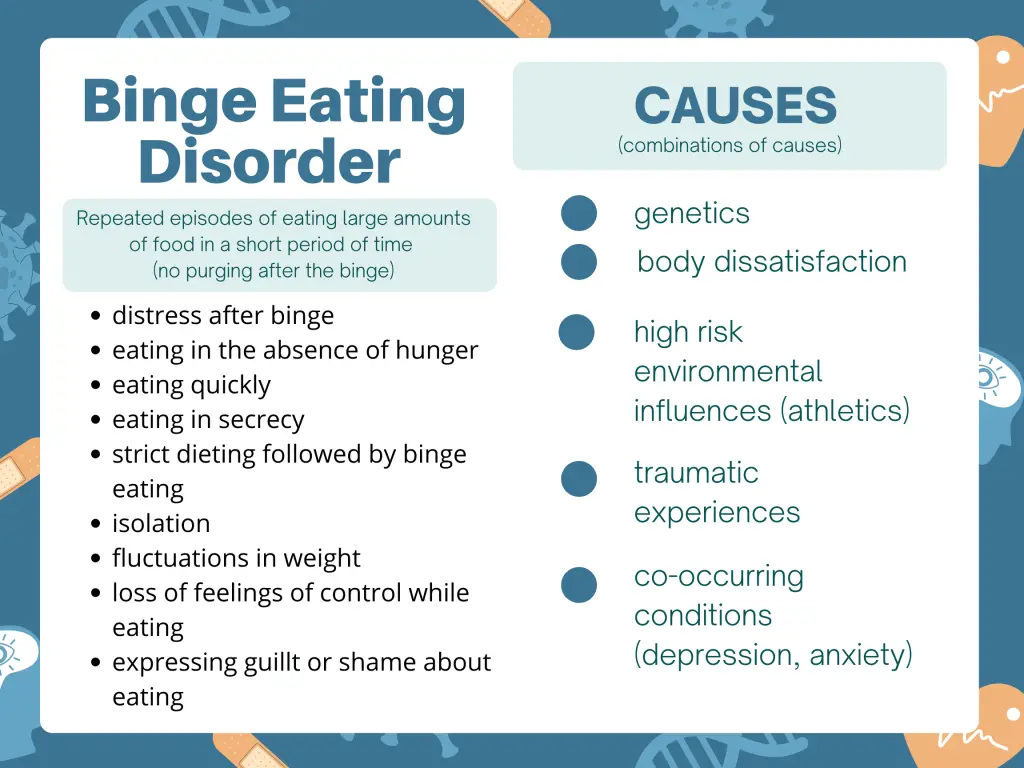
The two major reasons for this are physically hungering and negative feelings. To prevent this binging and restriction cycle, we must focus on them. The main cause of binging is often due to restricting calories during the day which in turn makes us extremely hungry by the end of the day or by night. T
his is when we are most likely to make poor decisions with our food and overeat. Alternatively, sometimes we binge eat because of negative emotions such as sadness, boredom, anxiety, self-hatred, etc. In order to stop this from happening, we need to work on addressing the emotional issues that lead to these binges. If we can do that, then we can finally break free from this restrictive cycle.
Is it normal to binge after restricting?
Bingeing can be a normal response to restricting, whether it’s food or emotional comfort. If you’re restricting calories or types of foods, your body may go into starvation mode and start craving high-calorie, nutrient-dense foods. This is the body’s way of trying to survive. Similarly, if you’re restricting emotional comfort, you may turn to food for solace. In either case, it’s important to listen to your body and give yourself what you need, whether that’s more food or more rest. Otherwise, you may end up feeling worse in the long run.
How do you break the Bingeing Cycle?
At Eating Enlightenment, we start with journaling. Journaling is great because you get to track your behaviors as they go from restriction to bingeing to shame and repeating.
By seeing a written record of your thoughts, behaviors and emotions – bringing awareness to YOUR Binge Restriction Cycle – you can start to become free.
For example, by keeping a journal in your periods of restriction, you’ll see how your food rules or lifestyle is restrictive in some way and leads to nutritional or emotional deprivation.
You can then start to address the underlying causes which create that deprivation in you, and ultimately cause a binge.
You can also journal in shame (which is what you feel after bingeing). This shame usually manifests in another round of restriction, so you can catch the cycle before it begins.
Learn about our free mindful food journal app.
Understanding the Restriction-Binge Cycle: The Dieting Pendulum
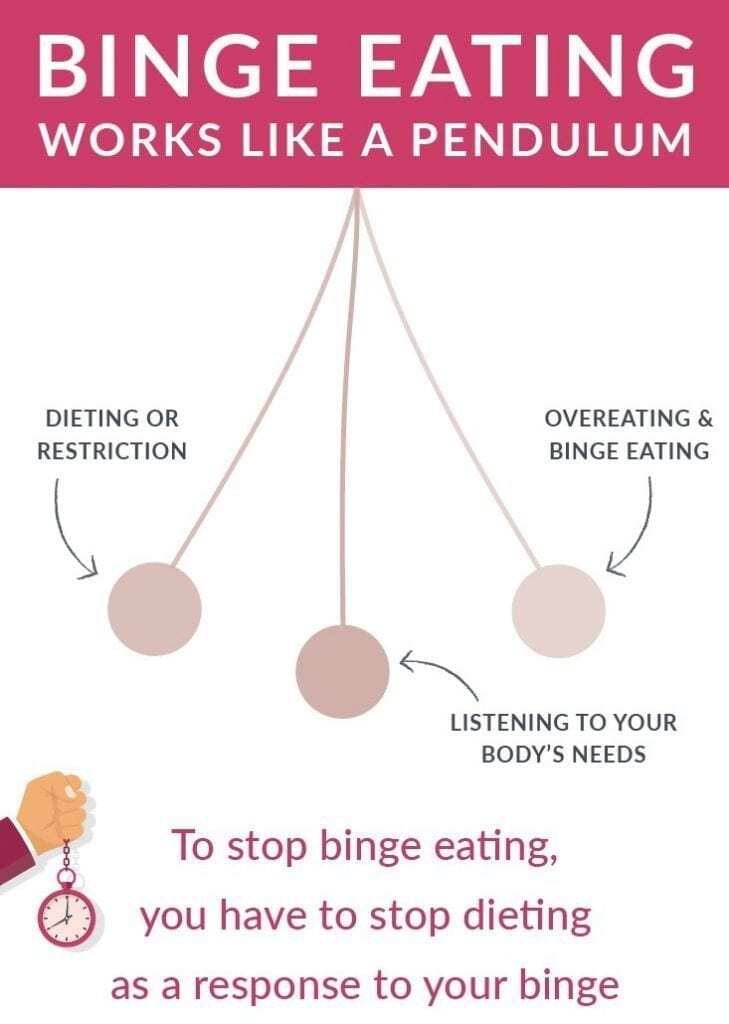
Most people who have battled with their weight have experienced the restriction-binge cycle at some point. It goes like this: you start a new diet, cutting out all of your favorite foods and drastically reducing your calorie intake.
You may not even officially diet, but instead you avoid binge foods. Or maybe you have a strict rule for no gluten or carbs. Perhaps you follow keto religiously. You may not be on an official diet. The point is whether or not you feel physically or emotionally restricted.
Either way, for a while, you stick to your plan and see results. But eventually, you reach a breaking point. You’re so Hungry from all the Restriction that you give in and binge on the very foods you’ve been depriving yourself of. This sets off a cycle of guilt and shame, which leads to more restriction, which leads to more bingeing. It’s a vicious cycle that can be hard to break free from. But it’s important to understand that it’s not your fault.
The diet industry is built on the idea of restriction and deprivation. They prey on our insecurities and convince us that the only way to be happy and successful is to be thin. But the truth is, you can be happy and successful at any size. And yo don’t have to restrict yourself to achieve your goals. When you make the decision to love and accept yourself just as you are, you open the door to true happiness and success. And your health outcomes are better too 🙂
How undereating causes overeating?
When we under eat, our body responds by trying to conserve energy. This is a survival mechanism that is hardwired into our animal brain. The part of the brain responsible for this response is called the limbic system. When the limbic system detects that we are not getting enough food, it triggers a series of events that result in us feeling hungry.
First, it makes us crave high-calorie foods that will give us a quick burst of energy. Second, it lowers our levels of leptin, the hormone that tells us when we are full. As a result, we can quickly find ourselves overeating even when we are not really hungry.
The key to avoiding this response is to make sure that we eat regular meals throughout the day. By keeping our bodies nourished, we can avoid triggering the survival mechanism that leads to overeating.
Of course there is emotional deprivation as well, don’t forget!
But specifically for under eating, if you get into the Red Zone (on the hunger side) you are much more likely to binge so watch out!
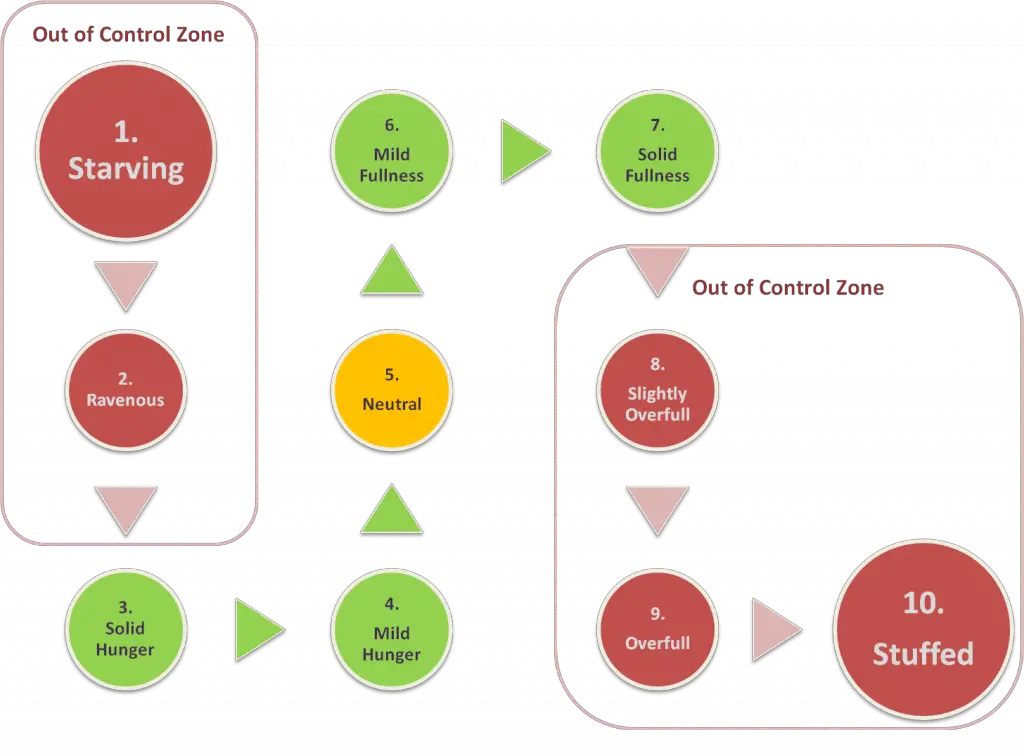
What To Do Instead Of Eating If I have an Urge To Binge?
This is a tricky question because you really first need to understand the Binge Diet Cycle. You have to understand where you’re at in the cycle, how the cycle works, and what triggers the cycle to go for you personally.
There are a few key things to keep in mind.
First, bingeing is usually a way of numbing out or coping with emotions. If you can identify the emotions that lead to your bingeing, you can start to find other ways to cope with them.
Second, bingeing is usually triggered by restrictive eating. If you’re restricting your food intake in some way, whether it’s through dieting or avoidance of certain foods, you’re more likely to binge. The key is to eat regular meals and snacks throughout the day so that you don’t get too hungry.
And finally, remember that you are not alone. There are many people who have been where you are and have come out the other side. You can too!
If you or someone you know is struggling with binge eating, please reach out for help. There are many resources available to you.
Know your Triggers
While the Binge-Restrict Cycle is the underlying pattern, how this manifests in your life will be different for every person.
Some people have more nutritional deprivation than emotional, and vice versa. Triggers also come in all sorts of situations and may be triggered by different feelings or beliefs.
The first step to breaking free from bingeing is to get to know your triggers. What situations, emotions, or thoughts lead you to binge? Once you identify your triggers, you can start to find other ways to cope with them.
There are many different ways to cope with the urge to binge. Some people find that journaling, talking to a friend, or going for a walk helps. Others find that they need to do something more active, like hitting the gym or going for a run. Experiment and see what works for you. The important thing is that you find a way to cope that doesn’t involve bingeing.
One of the best things of journaling is that it interrupts the triggers from firing automatically! Because you automatically pause.
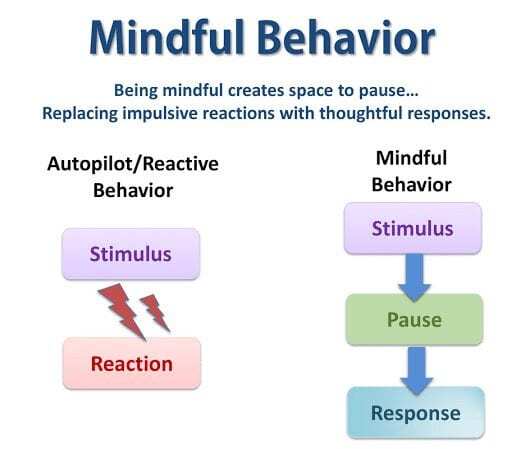
What are the benefits of stopping the binge restrict cycle?
If you’re stuck in the binge restrict cycle, you’re probably all too familiar with the feelings of guilt and shame that come with overeating, followed by the sadness and frustration of restriction. But it doesn’t have to be this way! Stopping the cycle can lead to a life of freedom and peace of mind. When you break free from the cycle, you’ll be able to go out with friends and enjoy meals without stress or anxiety.
You’ll also be able to focus on more important things in life, like your relationships, your career, and your hobbies. And best of all, you’ll finally be able to achieve your long-term health goals. So if you’re ready to make a change, don’t wait any longer – break free from the binge restrict cycle today!
Practical Tips to Stop the Binge-Restrict Cycle
If you’d like to get started there are two basic things you can do.
1) Start journaling before you eat. Just a few words. Are you feeling restricted or hungry?
2) Really pay attention to your hunger. Try to make sure you are eating at least 3 meals per day and 1-2 snacks. Make sure you have some protein. Having adequate food is highly important to treat any type of problematic eating pattern.
The key is studying your deprivation.
What makes you feel deprived? Is it hunger? Where your not eating enough, or when you do eat it’s not because you’re hungry?
Or is it more emotional? You’re working too hard, not resting, and caregiving without caring for yourself?
Find your deprivation. Use a journal to track your deprivation – what leads up to it, what are your thought processes, etc. Really study your patterns so you become clear if you’re eating for hunger, or for emotional / mental reasons.
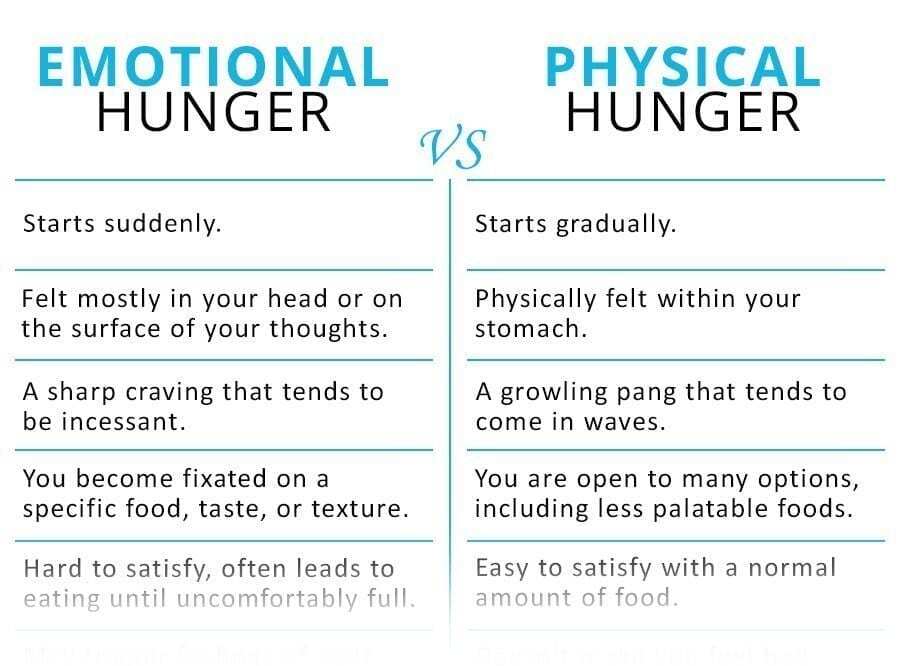
How to Stop Binge Eating Disorder
In this post we are covering the Binge-Restrict Cycle.
Of course the next question is how do you stop this disorder, disease, and problem?
Well, in a future post I will collect various expert’s diverse perspectives and share them with you.
I will also use this opportunity to briefly mention journaling and parts work, which I believe complement any approach you decide to take.
No matter what “path” you feel is best for you, journaling and parts work through Eating Enlightenment can help.
We are not here to tell you what, or how to eat. If you don’t believe in food addiction and want to practice unconditional eating, that’s fine. If you believe in food addiction and want to avoid certain food groups, that’s fine.
We’re here to help you discover what works best for you.
Through journaling and studying this restrict binge cycle, you better know your triggers, and what causes deprivation for you personally – from extreme hunger to food restriction to loneliness to fear foods.
Because what’s what we want here – we want you to become Enlightened to this pattern, and how it manifests in YOUR life.
Journaling, working with a coach can help – but we are NOT here to tell you ‘the answer’.
Eating Enlightenment is great solution for some people – just see our numerous video testimonials on our website. However, Eating Enlightenment is more like a ‘complement’ to any health program.
By journaling, by getting feedback, by being held accountable, by simply talking and sharing and studying your habits and eating patterns – you will make progress, and grow no matter what.


